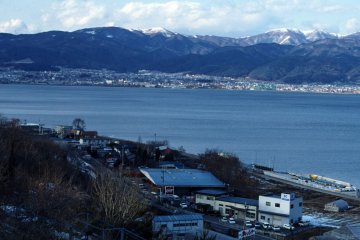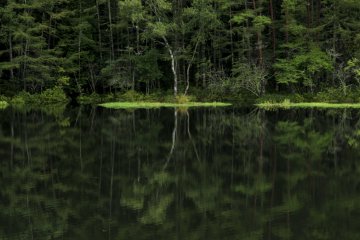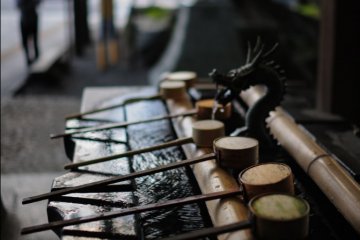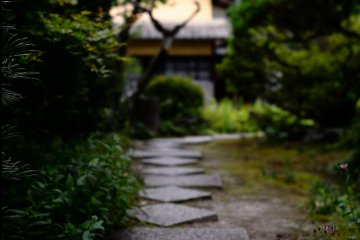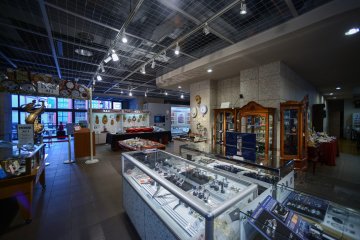There are many things to do in Suwa, and this short guide should serve as an example day trip to get you started in the area. I am taking on a few of the more well-known locations in the area, primarily those locations tied closely with Japanese history and culture.
These locations are in close proximity to each other, nearby Shimo-Suwa Station. These could all be reached on foot, but if you prefer to speed things up a rental bicycle is a fun option. Here is the one-day itinerary.
Part One: Suwa Taisha Shrine
Suwa Taisha, or Suwa Grand Shrine, is of Shinto origin and is one of the oldest shrines in Japan. The shrine areas are surrounded by thick trees and landscaped gardens and are accessible by walking or cycling. There are four building complexes, including the Maemiya (old or front shrine), Honmiya (main shrine), Harumiya (spring shrine), and the Akimiya (fall shrine). Suwa Taisha is the head shrine for a network of over 10,000 related Suwa shrines nationwide.

Part Two: Sweet Snacks at Shintsuru Honten
Yokan, a traditional Japanese confectionery, is a type of sweet and salty jelly dessert that has been in creation for hundreds of years in the Suwa area. One well-known shop that dates back over 140 years old specializes in a yokan variety called Shintsuru. In addition to the original recipe, there are dozens of assorted samples in all shapes and colors. Pieces of yokan can be purchased individually or in boxes and the tastes vary greatly in the degree of sweetness. My personal favorite was the sugar-coated variety in orange and green colors. The store owners will often have a few types available to sample so I recommend trying a few in the shop and then buying a box of your favorites as a souvenir.

Part Three: Clock Tower and Watch Museum Gishodo
Gishodo is a special museum for fans of timepieces and wall clocks. On the first floor is a large souvenir and watch shop, where various novelty items and modern watches can be purchased. The museum features a large exhibition room where visitors can learn about the history and ingenuity of Japanese watchmaking while viewing a collection of more than 400 watches and clocks from the Edo Period (1603-1868) to today. Upstairs is an activity area, with several interactive displays, and there are watch- and clock-making experiences available that involve visitors creating their own timepiece with guidance from staff. Outside the museum is an enormous water-driven clock tower known as Suiun-Gishodai, or the Astronomical Clock Tower in English. The clock tower is a restoration of a clock tower created the year 1092 in China’s Kaifeng, a prominent city of the Northern Sung Dynasty. The tower is powered by water wheels and chimes in different patterns with coordinated doll movements at regular intervals. The clock tower also shows the location and tracks stars with a telescope. Seating is provided nearby for those who wish to listen and watch.

Part Four: Honjin Iwanamike (Samurai House)
This beautifully-preserved landmark was once a high-class accommodation for royalty and key leaders across Japan. The house has been preserved remarkably well and has a Japanese architecture style unique to the region. It was created in the Kyoto style, but with some key differences in the structure, interior design and roofing. As the house was made for royalty, there are escape rooms and hatches built-in to protect the esteemed guests from possible attack. The back room is an open tatami seating area that faces one of the most beautifully sculpted gardens in the region. The scene provides an excellent photographic opportunity during all four seasons and a nice place to sit and relax for a few minutes between your travels.

Additional Information
There is much more to Suwa than what we have listed here. Check out the additional links below.
- Suwa Feature — Japan Travel collection of Suwa Area content
- Suwa Official Website — Official Suwa tourism website





